Enjoy FREE Shipping on Orders Over $99
DON’T HAVE A COUPON CODE?
Use EZ10OFF At Checkout to Save 10% On Your Entire Order Today!
5 Easy Tips for Better Sleep

You may not know it, but a bad night’s sleep does more than leave you feeling groggy, fatigued, and irritable the next morning. When you routinely have a bad night’s sleep, you increase your risk of major health problems like heart disease, high blood pressure and stroke. You also risk personal injury operating a motor vehicle and/or on the job through lack of focus, and you increase the risk of harming others around you. According to the National Highway Traffic Safety Administration, sleep deprivation causes an estimated 100,000 auto crashes and 1,550 crash-related deaths a year in the U.S.
Fortunately, a good night’s sleep is fairly easy to fix. Here are the top five things keeping you from a solid night’s rest, and what you can do about them.
1. Rings, Bleeps and Blue Light
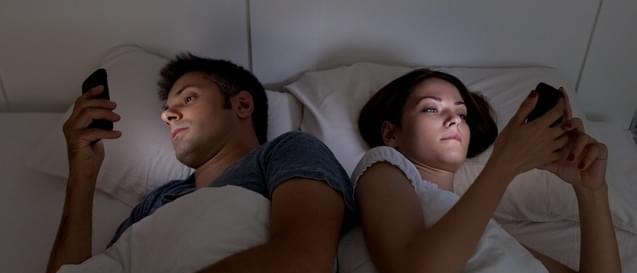
If you sleep with your smartphone or tablet beside your bed, the sound of a ringtone or text alert is bad enough to disrupt sleep. But if you’re in the habit of scrolling through Facebook or watching YouTube while tucked under the covers, you’re actually suppressing a key sleep hormone.
You awaken and sleep according to a natural biological clock called the circadian rhythm. During the day, blue wavelength light from the sun boosts attention, reaction time and mood. At night, without exposure to the sun, your body clock switches to sleep mode and produces the sleep hormone melatonin. Electronic devices give off the same blue light as the sun, which suppresses melatonin and throws your body clock out of whack for a bad night’s sleep.
A few simple remedies:
2. Your Mattress Has Passed Its “Best Before Date”
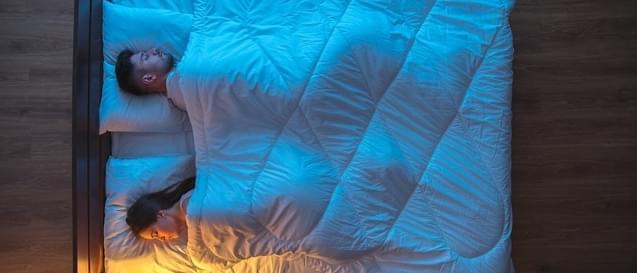
Mattresses are big, expensive and everyone hates moving them (especially if you have to cram one up some stairs or into an elevator). Yet the quality, comfort and support of your mattress is a major player in the quality of your sleep, and if you can’t remember the last time you bought a new one, it’s probably time.
The general consensus among mattress manufactures is that you should replace your mattress every 8-10 years. So if your once-cushy mattress is now looking and feeling like a waffle that’s been run over by a truck, invest your cash into the best-quality new mattress you can find (and for someone to deliver it for you). :)
3. Light Pollution
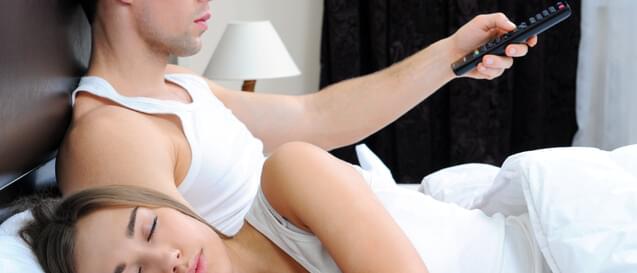
Electronic devices aren’t the only sources of nighttime light that can disrupt your sleep. As a side effect or urbanization, general light pollution at night from street lights, buildings, offices and more can cause major sleep disruption.
Your skin has light-sensitive receptor cells called rhodopsin (also found in your eyes). When light pollution spills onto your skin, your skin “sees” this light and begins producing daytime levels of hormones and other chemicals that disrupt sleep and keep you awake.
To avoid this, make sure you have drapes or blinds that completely screen out light pollution. Or buy a sleep mask. They come in a range of colors, fabrics, and options, including fleece and soothing gel beads. If you’re a guy and that sounds too weird, grab a plain black mask and sleep soundly knowing you look like a super hero. ;)
4. Car Chases and Other Small-Screen Thrills
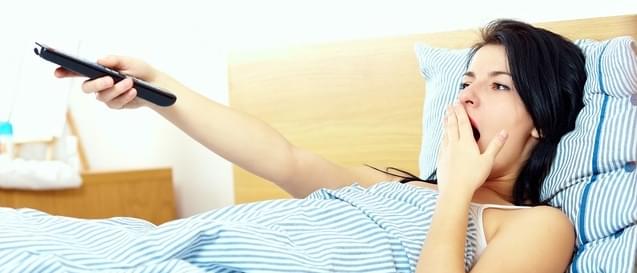
Did you hear about the person who fell asleep right in the middle of watching a big car chase on TV? Of course you didn’t. That’s because TV stimulates the brain and triggers emotions that cause surges of hormones like adrenaline, which boosts energy, speeds up your heart rate and puts you on hyper alert. In other words, watching TV before bed may feel relaxing. But watching TV before bed can saturate your body with chemicals that’ll keep you awake for hours. For optimal sleep, experts recommend turning off the TV about an hour before bed.
5. Temperature (or, Too Much of the First or Second Porridge)
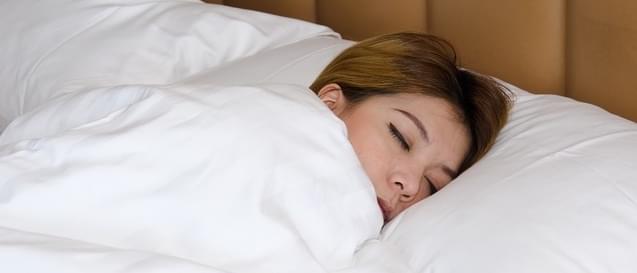
According to the National Sleep Foundation, the best temperature for sleeping is 65 degrees Fahrenheit (or 18 degrees Celsius), which may seem chilly. But the right thermal environment is one of the most important factors affecting your sleep.
Through a natural process called thermoregulation, your body decreases in temperature as it enters the sleep cycle. When your room is too hot, the heat raises your core temperature toward daytime levels. This signals your body to raise energy to daytime levels, which causes restless and broken sleep. So dial the thermostat down in the colder weather and grab an extra blanket if needed.
The reverse is true in hot weather. An overly chilly room from air conditioning will also cause restless sleep. So set air conditioning to around 65 degrees. If you don’t have air conditioning, run fans, or open windows for a cross-breeze.
To summarize using the Goldilocks analogy: For optimal sleep, you don’t want your room temperature to be the first bowl of porridge (too hot) or second one (too cold). You want it to be the third bowl (Ah... just right)!
Dedicated to helping you achieve optimal health and wellness,